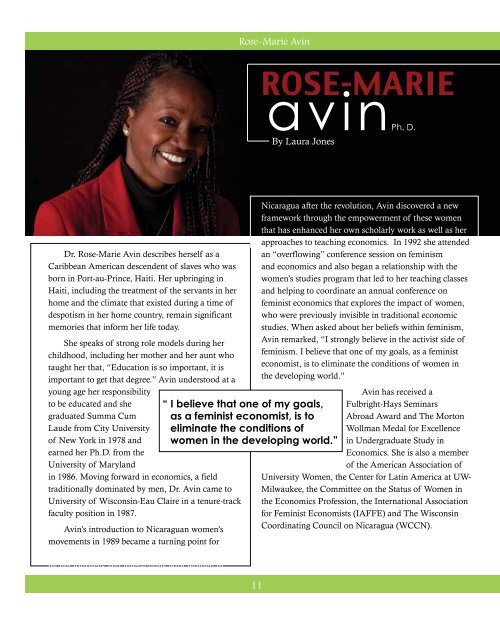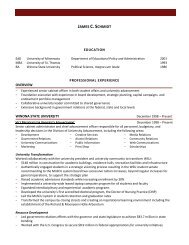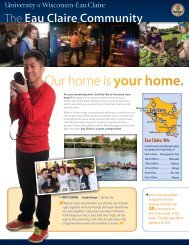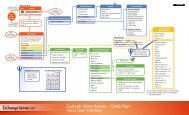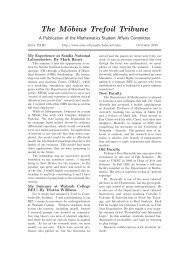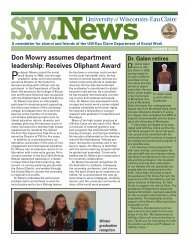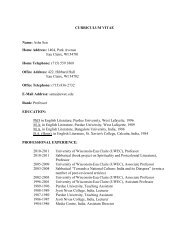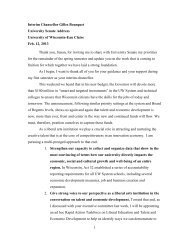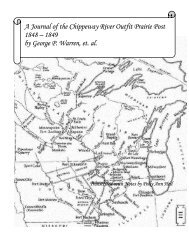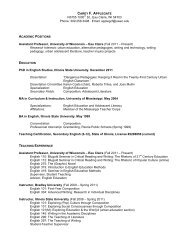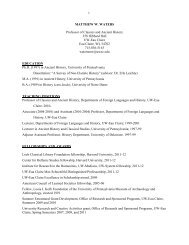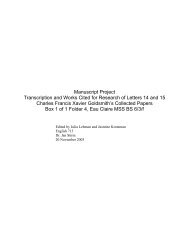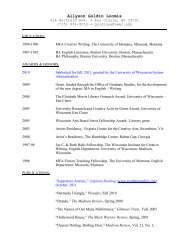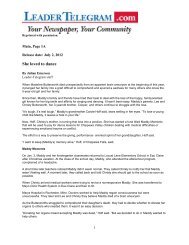Sarah Harder - University of Wisconsin-Eau Claire
Sarah Harder - University of Wisconsin-Eau Claire
Sarah Harder - University of Wisconsin-Eau Claire
Create successful ePaper yourself
Turn your PDF publications into a flip-book with our unique Google optimized e-Paper software.
Dr. Rose-Marie Avin describes herself as a<br />
Caribbean American descendent <strong>of</strong> slaves who was<br />
born in Port-au-Prince, Haiti. Her upbringing in<br />
Haiti, including the treatment <strong>of</strong> the servants in her<br />
home and the climate that existed during a time <strong>of</strong><br />
despotism in her home country, remain significant<br />
memories that inform her life today.<br />
She speaks <strong>of</strong> strong role models during her<br />
childhood, including her mother and her aunt who<br />
taught her that, “Education is so important, it is<br />
important to get that degree.” Avin understood at a<br />
young age her responsibility<br />
to be educated and she<br />
graduated Summa Cum<br />
Laude from City <strong>University</strong><br />
<strong>of</strong> New York in 1978 and<br />
earned her Ph.D. from the<br />
<strong>University</strong> <strong>of</strong> Maryland<br />
in 1986. Moving forward in economics, a field<br />
traditionally dominated by men, Dr. Avin came to<br />
<strong>University</strong> <strong>of</strong> <strong>Wisconsin</strong>-<strong>Eau</strong> <strong>Claire</strong> in a tenure-track<br />
faculty position in 1987.<br />
Avin’s introduction to Nicaraguan women’s<br />
movements in 1989 became a turning point for her<br />
as she discovered the power <strong>of</strong> feminism. Affected<br />
by her journeys and interactions with women in<br />
Rose-Marie Avin<br />
ROSE-MARIE<br />
avin<br />
By Laura Jones<br />
“ I believe that one <strong>of</strong> my goals,<br />
as a feminist economist, is to<br />
eliminate the conditions <strong>of</strong><br />
women in the developing world.”<br />
11<br />
Ph. D.<br />
Nicaragua after the revolution, Avin discovered a new<br />
framework through the empowerment <strong>of</strong> these women<br />
that has enhanced her own scholarly work as well as her<br />
approaches to teaching economics. In 1992 she attended<br />
an “overflowing” conference session on feminism<br />
and economics and also began a relationship with the<br />
women’s studies program that led to her teaching classes<br />
and helping to coordinate an annual conference on<br />
feminist economics that explores the impact <strong>of</strong> women,<br />
who were previously invisible in traditional economic<br />
studies. When asked about her beliefs within feminism,<br />
Avin remarked, “I strongly believe in the activist side <strong>of</strong><br />
feminism. I believe that one <strong>of</strong> my goals, as a feminist<br />
economist, is to eliminate the conditions <strong>of</strong> women in<br />
the developing world.”<br />
Avin has received a<br />
Fulbright-Hays Seminars<br />
Abroad Award and The Morton<br />
Wollman Medal for Excellence<br />
in Undergraduate Study in<br />
Economics. She is also a member<br />
<strong>of</strong> the American Association <strong>of</strong><br />
<strong>University</strong> Women, the Center for Latin America at UW-<br />
Milwaukee, the Committee on the Status <strong>of</strong> Women in<br />
the Economics Pr<strong>of</strong>ession, the International Association<br />
for Feminist Economists (IAFFE) and The <strong>Wisconsin</strong><br />
Coordinating Council on Nicaragua (WCCN).


